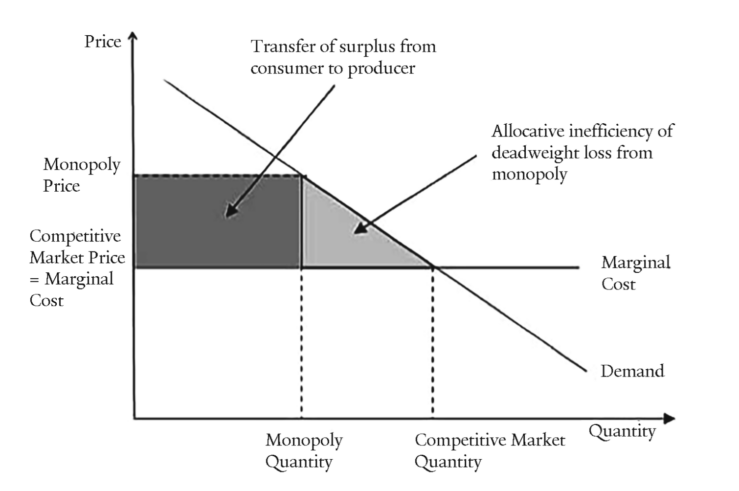Showing results for: “price gouging”
FTC Rulemaking Under UMC Could Mean Return of the National Nanny
The Federal Trade Commission (FTC) has been in the antitrust-enforcement business for more than 100 years. Its new leadership is considering some of the biggest changes ever in its enforcement methods. Instead of a detailed analysis of each case on its own merits, some FTC leaders now want its unelected bureaucrats to write competition rules ... FTC Rulemaking Under UMC Could Mean Return of the National Nanny
Making Rules vs Ruling
In an effort to fight inflation, the Federal Open Market Committee raised interest rates to 20% over the course of 1980 and 1981, triggering a recession that threw more than 4 million Americans, many in well-paying manufacturing jobs, out of work. As it continues to do today, the committee met in secret and explained its ... Making Rules vs Ruling
NEW VOICES: FTC Rulemaking for Noncompetes
On July 9, 2021, President Joe Biden issued an executive order asking the Federal Trade Commission (FTC) to “curtail the unfair use of noncompete clauses and other clauses or agreements that may unfairly limit worker mobility.” This executive order raises two questions. First, does the FTC have the authority to issue such a rule? And ... NEW VOICES: FTC Rulemaking for Noncompetes
The FTC Abandons the Free Market
In December 2021, the Federal Trade Commission (FTC) released its statement of regulatory priorities for 2022, which describes its intention to expand the agency’s rulemaking activities to target “unfair methods of competition” (UMC) under Section 5 of the Federal Trade Commission Act (FTC Act), in addition to (and in some cases, presumably in place of) ... The FTC Abandons the Free Market
Chevron and Administrative Antitrust, Redux
[Wrapping up the first week of our FTC UMC Rulemaking symposium is a post from Truth on the Market’s own Justin (Gus) Hurwitz, director of law & economics programs at the International Center for Law & Economics and an assistant professor of law and co-director of the Space, Cyber, and Telecom Law program at the ... Chevron and Administrative Antitrust, Redux
National Petroleum Refiners v FTC: A Tale of Two Opinions
In 1972, a case came before Aubrey E. Robinson, Jr., a judge on the U.S. District Court for the District of Columbia, involving the scope of the Federal Trade Commission’s (FTC) regulatory authority. Section 5(a)(1) of the Federal Trade Commission Act outlaws “unfair methods of competition.” Section 6(g) says that the FTC may “make rules ... National Petroleum Refiners v FTC: A Tale of Two Opinions
The Paradox of Choice Meets the Information Age
Barry Schwartz’s seminal work “The Paradox of Choice” has received substantial attention since its publication nearly 20 years ago. In it, Schwartz argued that, faced with an ever-increasing plethora of products to choose from, consumers often feel overwhelmed and seek to limit the number of choices they must make. In today’s online digital economy, a ... The Paradox of Choice Meets the Information Age
Attention Markets: They Know Them When they See Them
A raft of progressive scholars in recent years have argued that antitrust law remains blind to the emergence of so-called “attention markets,” in which firms compete by converting user attention into advertising revenue. This blindness, the scholars argue, has caused antitrust enforcers to clear harmful mergers in these industries. It certainly appears the argument is ... Attention Markets: They Know Them When they See Them
Assessing Less Restrictive Alternatives and Interbrand Competition in Epic v Apple
The International Center for Law & Economics (ICLE) filed an amicus brief on behalf of itself and 26 distinguished law & economics scholars with the 9th U.S. Circuit Court of Appeals in the hotly anticipated and intensely important Epic Games v Apple case. A fantastic group of attorneys from White & Case generously assisted us ... Assessing Less Restrictive Alternatives and Interbrand Competition in Epic v Apple
In Apple v Epic, 9th Circuit Should Remember that Antitrust Forbids Enhancing, not Exercising, Market Power
On March 31, I and several other law and economics scholars filed an amicus brief in Epic Games v. Apple, which is on appeal to the U.S. Court of Appeals for Ninth Circuit. In this post, I summarize the central arguments of the brief, which was joined by Alden Abbott, Henry Butler, Alan Meese, Aurelien ... In Apple v Epic, 9th Circuit Should Remember that Antitrust Forbids Enhancing, not Exercising, Market Power
Toward a Dynamic Consumer Welfare Standard for Contemporary U.S. Antitrust Enforcement
For decades, consumer-welfare enhancement appeared to be a key enforcement goal of competition policy (antitrust, in the U.S. usage) in most jurisdictions: The U.S. Supreme Court famously proclaimed American antitrust law to be a “consumer welfare prescription” in Reiter v. Sonotone Corp. (1979). A study by the current adviser to the European Competition Commission’s chief ... Toward a Dynamic Consumer Welfare Standard for Contemporary U.S. Antitrust Enforcement
Antitrust Policy and National Security Interests
U.S. antitrust policy seeks to promote vigorous marketplace competition in order to enhance consumer welfare. For more than four decades, mainstream antitrust enforcers have taken their cue from the U.S. Supreme Court’s statement in Reiter v. Sonotone (1979) that antitrust is “a consumer welfare prescription.” Recent suggestions (see here and here) by new Biden administration ... Antitrust Policy and National Security Interests












